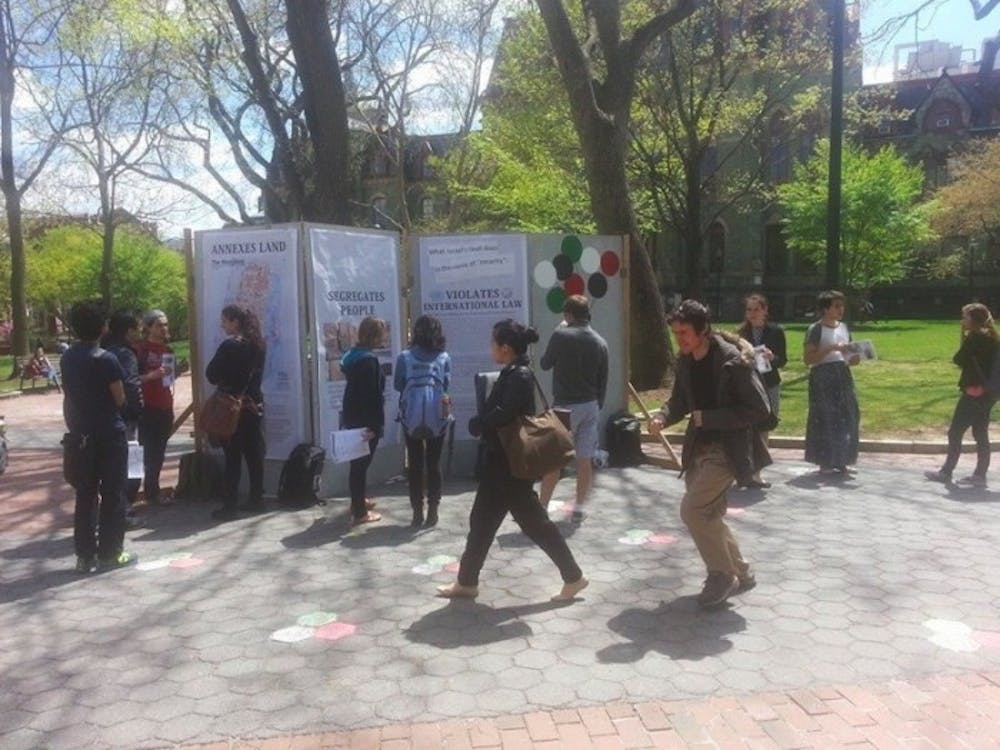
When Penn Students for Justice in Palestine first appeared on College Green, I asked my friends, “Why during the high holidays?” They always point to some urgent injustice or another immediately occurring in Israel. I’ve always felt nauseous afterwards — not from anti-Semitism, but because I realized that the Jewish state gives their every protest no shortage of justification. Why should SJP limit the timing of advocacy when its necessity is regularly reaffirmed by the state we hold so dear?
Ariela Stein’s column last week displays less an earnest desire to understand than a show of power, demanding parameters of discourse when her side already dominates effective speech. These demands are especially disingenuous when those who make them engage in imitation-play of the American Israel Public Affairs Committee. Or when they are members of a group that organizes Wikipedia propaganda campaigns and maligns critics of Israeli policy as defamers (including Haaretz, the longest-running Israeli newspaper).
Vague allusions to “democracy” are problematic when conversationalists engage in AIPAC-play. How can somebody gesticulate for respect or talk substantially about democracy, when, at the behest of AIPAC, a bipartisan set of 43 senators want to make boycotts of Israel a felony? When at the whim of the Israeli state, if perceived as an advocate of the boycott, divestment, and sanctions movement, I can be exiled from the land of my kin and heart? As a French-born Jew, I am amused at Stein’s reference to American liberal heart-throb Emmanuel Macron, whose government joins Israel in enforcing legal punishments for BDS advocacy. To ask for respect is ridiculous when your interlocutor already has so little power and large governments attack what little autonomous power they have left.
Portraying SJP programming during Jewish holidays as cheap anti-Semitism is a bit ridiculous when every year representatives from across campus reaffirm the idealized connection between the United States and Israel. This phenomenon of a natural link between the two countries, posited prior to actual argument, is not metaphysical but in fact a mobilization of pro-Israel lobbies run by both evangelical Christians and American Jews. There can never be a dialogue among equals when one group of speakers can be heard behind the closed doors of the chambers of Congress. To then impose demands of respect takes chutzpah.
Toward Stein’s specious defenses of Israel:
The column treats “Israel” as the body of Israeli citizens and political apparatuses, neglecting its relationship to noncitizen residents, those in Palestinian territories, and transient labor. Israel still regulates various aspects of non-Israeli life, including water rights, border crossings, blockades, illegal collective punishment, discriminatory housing practices, etc. To what degree are Palestinians really represented in Israel?

In the entire territory, about one in every three people have no parliamentary voting rights. Within the Green Line, Arabs can vote, but can they cannot meaningfully participate in democracy. They rarely hold government positions and Arab parties have never been in a coalition government. Even legislators are treated with contempt: When Mike Pence spoke to the Knesset, Arab members were forcibly thrown out for holding signs in protest.
Beyond political representation, integration is an empty fetish. Tel Aviv, where tourists stroll Rothschild boulevard, is 95 percent Jewish. To drive through the Israeli countryside is to distinguish villages as Palestinian, Jewish, or Druze by their architecture. Inequality strikes along racialized backgrounds, with indigenous Arabs (and indigenous Jews) receiving the short end of the stick compared to their richer and whiter neighbors. Jews of color have suffered throughout Israel’s history, in their own journey to thrive in their purported birthright.
Also present in Stein’s article were ad hominem arguments lacking merit and nuance alike. Palestinian Authority restrictions on sale of property to Jews make sense in the present context of West Bank settlements. To suggest that this law is segregationist, when its absence would mean the introduction of homogenous Jewish settlements, is aweing. I concede that Middle Eastern governments exploit Palestinian refugees as political pawns. But to divert attention to this fact as the real apartheid is to simultaneously justify the original expulsion of Palestinians from their homes and to deflect from Israel’s abuse of Palestinians living under its jurisdiction.
I was also shocked that Stein took the existence of Palestinian athletes as evidence of how good things are for Palestinians. Have you ever heard of the Palestinian soccer player, Mahmoud Sarsak, who was unduly held and tortured for three years (as if this could be justified)?
Further, the notion that civil rights and representation for Arabs (however limited) living in Israel refutes culpability for apartheid-like policies suggests a totalizing and binary view of Arabs. No distinction is even made for the Druze, a unique ethnic population that tends to have Zionist sympathies.
The bittersweetness of Passover, more than vestiges of charoset and maror, lasts well into Deuteronomy. The celebration of our liberation precedes the mitzvah to ethnically cleanse Israel of idolaters. Ashkenazi Jews in the US are afforded power in discourses on Israel, and Israel wields power over Palestinians. We cannot in good conscience, as Stein does, police rhetorical provocations made on a campus and in a country bereft of criticism of Israeli policy.
CARL-EMMANUEL FULGHIERI is a College junior from Carrboro, N.C. studying economics and philosophy. Fulghieri is a former DP staff reporter. His email address is caful@sas.upenn.edu.
The Daily Pennsylvanian is an independent, student-run newspaper. Please consider making a donation to support the coverage that shapes the University. Your generosity ensures a future of strong journalism at Penn.
Donate







